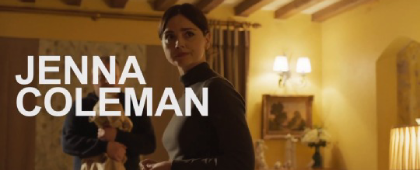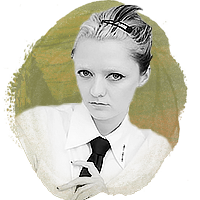

Telegraph-As she hits the West End, the actress reveals how she beat ‘The Serpent’ curse – and why she dreams of putting Blackpool on the big screen.
“Can you imagine what you’d say,” asks Jenna Coleman, “if the Government was about to enforce a law that meant you could only speak 140 words per day?” She shakes her head and takes a bracing slug of coffee. “If you were in a relationship, I think you might decide to just get it all out before the law came in. Have an exorcism, spit out all the problems and see where that leaves you.”
This is what happens in Lemons Lemons Lemons Lemons Lemons, a play by Sam Steiner which explores a young couple’s response to a dystopian world in which words are rationed by “hush laws”. In a new production opening in the West End this month, 36-year-old Coleman – best known for her TV roles in Doctor Who, Victoria and The Serpent – will star as rule-abiding lawyer Bernadette who meets and moves in with rebellious musician Oliver (Poldark star Aidan Turner) as the hush laws become increasingly harsh.
“Obviously those kinds of laws would be totally unenforceable,” admits the show’s director, Josie Rourke. “So it asks you to play along and consider how relationships survive under extreme circumstances. It’s not a pandemic play, but it will resonate with people who found the cracks in their relationships widening during lockdown.”
Rourke notes that Coleman shares a “considered clarity” with her character, which is evident when I meet the actress over a pre-rehearsal breakfast. There’s a crisp definition to her black and white clothes and peroxide bob (dyed for her role as a “pixie punk biker” in upcoming movie Jackdaw), and she weighs her answers to my questions with care.
“I’m a bit of a turtle,” she says with a grin. “I come out of my shell for work and then I like to pull myself back in. Go home, shut the door, read a book.”
Born in Blackpool in 1986, and named after Priscilla Presley’s character in the American soap opera Dallas, Coleman is a carpenter’s daughter whose grandfather “has worked on the promenade, running hoopla and darts stalls, since the 1960s. He’s in his 80s now and still has a shed full of giant teddy bears. He gets on his bike and goes down there every day in the summer.”
Coleman has fond memories of her seaside childhood spent “running around the rock factory, racing down the promenade”. But while her older brother Ben followed in their father’s footsteps, becoming a joiner, Jenna was a more academic child who was made head girl of her school.
“I’ve got a complicated relationship with Blackpool,” she says. “Growing up, I’d be doing my Saturday chores aware that other people had come there for these more extreme experiences. It’s like Glastonbury, in a way. People are there to lose themselves, wanting a kind of obliteration.
“Somebody recently gave me a great book of photographs of stag and hen dos in Blackpool. There’s lights, glitter, happiness, feathers! Then this undertow of sadness. There’s something very cinematic about it and I really do want to make a film about it one day…”
She tails off. “But I needed to be an actor and I didn’t know how to make that happen in Blackpool. I wanted an unpredictable life. I was looking for different experiences. I wanted to tell other stories.”
Coleman joined a local theatre company while still at school, won an award for her performance in a production they took to the Edinburgh Festival, then in 2005 turned down a place to study English at York University to take on the role of lonely schoolgirl-turned-investigative journalist Jasmine Thomas in the popular TV soap Emmerdale. She was shocked and thrilled when the show’s writers took her “shy, moral” character on a four-year arc which ended with her battering to death her boyfriend (played by Paul McEwan) after he attempted to rape her.
‘It was such an adventure’: Coleman as Clara Oswald in Doctor Who episode Invasion of the Zygons CREDIT: Simon Ridgway/BBC
Coleman went on to play hard girl Lindsay James in the long-running school drama Waterloo Road (2009), a cockney sparrow in Julian Fellowes’ four-part miniseries Titanic (2012) and feckless Lydia Wickham in the BBC adaptation of PD James’s Jane Austen spin-off Death Comes to Pemberley (2013).
But she was best loved as Clara Oswald (playing three versions of the character in different eras) for the seventh, eighth and ninth series of Doctor Who between 2012 and 2015. Having never seen the show before she auditioned, she admits she was “terrified of getting involved until I met Matt [Smith, the Eleventh Doctor]. Then I realised: this is going to be fun! It was such an adventure.”
Her favourite scene came in the Christmas 2012 Special called The Snowmen, in which she played a Victorian barmaid who climbed up an invisible spiral staircase to find the Tardis parked on the clouds. “It was like being in a kids’ storybook,” she recalls. “There was something so Alice in Wonderland or Willy Wonka about it. Climbing up into a world of imagination.” Coleman adds that Steven Moffat, who wrote for the show between 2005 and 2017, “has the most brilliantly inventive mind. He writes scenes that are so beautifully moving without ever tipping into sentimentality. Although when Peter Capaldi took over as the Twelfth Doctor they would have these intense, sci-fi nerdy conversations in a language I didn’t understand!”
Playing Clara gave Coleman access to the weird world of science-fiction fan conventions, which was a bit of a lark. “Whovians are a real community,” she says, “they can be so joyous.” She recalls one fan proposing to another while she was standing in between them and hopes they are still together. Young Whovians often asked her where she’d go if she had a time machine and she used to reply: “Ancient Egypt, obviously.” But today she thinks she may opt instead “to drop into a great gig. I might go and see the young Sinatra. Or perhaps some soul. Curtis Mayfield, maybe?”
In 2015 – the year she was pictured on the cover of The Sun at a party with Prince Harry, whom she later described as “a friend of mine” – Coleman was cast in the title role of ITV’s royal drama, Victoria. She was approaching 30 when she began shooting the series as the 18-year-old monarch. “I’ve got a baby face,” she nods, before pointing out that her youthful appearance may not always have worked in her favour. “There are parts that I should maybe have been playing where people will have thought: you can’t do this, you look like a 15-year-old child!”
But she found inhabiting Victoria (opposite her then off-screen partner Tom Hughes as Albert) a “really fascinating experience. We’re so used to thinking of her as this stern-faced woman in portraits. So still and unamused. But I really grew to admire how fiercely, unapologetically opinionated and passionate she was. You can see that in her diaries, where she’d had too much sherry mixed with whatever and the words come spilling on to the page. She never bent herself to fit the role, or hid behind it. She got involved. She wrote to the police about Jack the Ripper, she wrote to the Elephant Man once a year. If they’d had social media in the 19th century she’d have been on Twitter all the time!”
Then, in 2021, came The Serpent, the BBC’s eight-part true crime drama about the serial killer Charles Sobhraj (Tahar Rahim), who drugged and murdered at least a dozen expats and travellers on the Far Eastern “hippie trail” in the mid-1970s. In a shift away from her more wholesome roles, Coleman beguiled viewers as Sobhraj’s inscrutable Quebecois fiancée-accomplice Marie-Andrée Leclerc. “Her psychology was so fascinating,” says Coleman. Leclerc died of ovarian cancer, aged just 38, in 1984. But she left behind diaries which helped Coleman understand her. “Charles became her God. She clung to him with this almost religious need. I think she was quite willingly under his spell. There was such intensity in the way she wrote. She enjoyed feeling that pain, enjoyed the self-sabotage and was addicted to being treated cruelly.”
Coleman still sounds vaguely rattled by the “mysterious” series of “fluke incidents and accidents that plagued the shoot” of The Serpent, during which, she says, “I had a nasty fall. It ended with the Thai crew going to temples to try to rid us of ‘The Serpent Curse’. I remember standing with Tahar on set, saying we have been through it all now, what else can go wrong? Cue Covid and the closing of international borders…”
Last month, Sobhraj was released from prison in Nepal, where he had served a 19-year sentence for his crimes. He is now threatening to sue the BBC over the “falsified” series. How does Coleman feel about that? Like the sensible head girl she still is, she tells me that she’s “sorry for the bore” but she’s “probably safer” not to comment.
Since making The Serpent, Coleman has stopped watching her own performances . “I used to view the rushes, to help me find the right tone. Maybe some of that’s because I didn’t go to drama school and I felt like I was learning on the job, catching up.” Least enjoyable of all, she says, was “watching myself when I was playing a character close to my own, like in Doctor Who”.
She shrugs. She’s currently in a relationship with Jamie Childs, who directed her in the recent Netflix adaptation of Neil Gaiman’s fantasy adventure The Sandman, but tells me she hasn’t seen any of it. “There’s something very nice about letting go.”
Over Christmas, Coleman went home to Blackpool and blew away the cobwebs on the prom. She’s still close to her childhood friends there and doesn’t feel that her fame has changed their dynamic. “I go away for long periods. Like this summer, I was in the US and Canada for six months, filming a series call Wilderness about a woman trying to kill her husband on holiday at the Grand Canyon. It was an intense experience and it probably changed me. But all my friends have been through their own experiences. One has been living in Costa Rica, another has been through a breakup and started dating again. So we’re always having to find each other again.”
In Lemons… the characters lose and find each other over the years. “It’s been so interesting to see the ebb and flow of a long-term relationship distilled down like that,” says Coleman. “Reading the script I’m always asking myself: what row have they just come from? It raises questions about what they choose to say and not say: where they leave silences and where they spend words on lies.” Coleman finishes her coffee. “Couples build their own language over time. Shorthand. But does ‘loveoo’ mean the same as ‘I love you’?”
What does Coleman think?
“Oh, I think we all need to work that one out for ourselves!”












